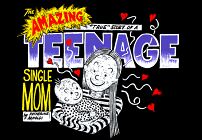

| The Amazing "True" Story of a Teenage Single Mom. By Katherine Arnoldi. New York: Hyperion, 1998. 1v. (unpaged). $16.00hc. ISBN 0-7868-6420-6. |

|
GENRES: AUDIENCE: SYNOPSIS: At the factory, she met a "goofy" guy, Dave, "handsome and tall," who seemed to like her and who also wanted to go out west. She was uncomfortable around him but later went out with him. It was love at first sight for her; he moved in with her, and they made plans. She, Stacie, and Dave drove in her van to Phoenix, where Dave worked as a roofer, though Kathy was uncomfortable when he came home with a gun and told her that his boss wanted him to be his "legal advisor" and learn to fly a plane. Still, "that was his business," and Kathy eagerly made plans to attend the University of Arizona. But when she told Dave, he blew up at her and beat her up. Because she'd made the huge mistake of putting everything in Dave's name, Kathy had nothing except her clothing, She bundled up her meager possessions and Stacie and walked away from Phoenix, intending to go to Denver to her former roommate, Debbie. Though she tried to hitchhike, she failed, so she and Stacie spent the night in the desert. Kathy thought about all the bad things that happened to her--how her mother hated her and made her live with her sister, how her brother-in-law molested her, how her sister threw her out after she hit her brother-in-law with a chair for beating up his son, and how she was raped after accepting a ride from a stranger. Would her life just be the same bad things over and over? But she had a bout of self-revelation while contemplating the many shooting stars abover her and was grateful for "all I had"--Stacie, of course. The next day, a friendly Hispanic truck driver picked up the two and drove them to Los Angeles, where he fed them, gave Kathy money, and got another trucker to take her to San Francisco. While still in LA, she looked up her father, whom she'd never met. He met with her and bought her dinner, but she was singularly unimpressed with him; Stacie wasn't too impressed either. From San Francisco, another trucker took Kathy and Stacie to Denver, buying them food along the way. Debbie received her kindly and took her in. Kathy got a job at a restaurant and started getting back on her feet, eventually getting her own apartment. Then she met Jackie, who got her involved in a babysitting exchange. When Jackie learned about Kathy's desire to go to college, she explained about Metro State College and financial aid. She helped Kathy sign up for school and get Stacie into day care. At Metro, Kathy took all kinds of classes, including horseback riding. She was especially thrilled when she got a work-study job drawing insects. Finally, she felt like she was doing something important and was on the verge of making a contribution! The book concludes with sections on "How to Go to College," a memorial to Jackie (who died in 1997), a warning about hitchhiking, and phone numbers for such things as the National Coalition Against Domestic Violence and Alateen. Quotes from such arts luminaries as Jane Fonda, Tillie Olsen and Roz Chast appear on the back cover and the last page. EVALUATION: One reason I really, really like about this book is that it is not at all preachy. At most, the book is cautionary, especially regarding hitchhiking. The admonishment for Kathy to lie in the bed she made--the sort of thing too many people put in "cautionary tales"--is both cruel and useless. (Moral pronouncements often are. Notice that they don't put food on the table or help change diapers.) This book faces the reality that Kathy bore a child as a child and still wants to live her life and feel like a valuable human being. One can assign blame forever, but at the core of the situation is a person who needs tools to deal with the world--and this book supplies some of them, from self-esteem to phone numbers. I also like this book because it has a very humanistic slant. Kathy draws strength from herself and from other people; her one vaguely spiritual moment is a profound sense of self-revelation, not your standard "my deity gave me strength." Of course, Arnoldi's habit of giving single mothers tools rather than criticism would tend to preclude such an attitude anyway. The black-and-white art, some drawings, some scratchboard, is cartoony and charming. Arnoldi often encircles panels with words (e.g., around a picture of Stacie are the phrases "The moon goes up for my kid * The sun comes up for my kid * The moon rises for my kid * The sun rises for her * The moon comes up * The sun goes up for her") or "twinks" (e.g., hearts around Stacie, eyes around surgical gloves to be inspected, southwestern-like patterns around desert scenes). The scenes of Denver are accurate as far as they go. (She worked at a restaurant, now long gone, that I ate at occasionally; I wonder if she served me? Wouldn't it be a small world if she did?) Arnoldi has won all kinds of fiction and drawing awards, though it's not clear if she won for this book. I hope she did. This is a marvelous book for teenagers, especially girls, but I should think it would also be inspirational to people facing other sorts of difficulties in their lives. Most highly recommended. |
Return to Rational Magic Home
